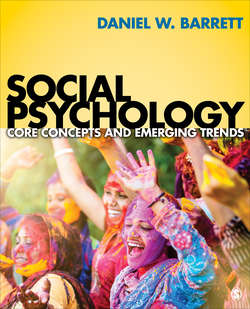Читать книгу Social Psychology - Daniel W. Barrett - Страница 179
На сайте Литреса книга снята с продажи.
SELF-REGULATION: CONTROLLING ONESELF
ОглавлениеHave you ever made a New Year’s resolution to start a new, good habit (such as exercising) or stopping an old, bad habit (like eating fast food) that you have been unable to maintain? If so, you are not unusual, and you are likely to do it again! According to one study, some 60% of people who failed to achieve their New Year’s goal will try again the following year (Prochaska, DiClemente, & Norcross, 1992). Initiating and maintaining self-related goals can indeed be challenging.
So far in this chapter we have described the self-concept as the set of beliefs about the self, self-esteem as the evaluation of the self-concept, and self-presentation as those efforts to project a particular image of the self to others. There is one more key aspect of the self that binds the first two together and impacts the third: self-regulation. Self-regulation is the capacity of the self to control our internal states and responses, including thoughts, feelings, and behavior (Bartels & Magun-Jackson, 2009; Baumeister et al., 2007; Blair, Ursache, Vernon-Feagans, & Greenberg, 2015; Vohs & Schmeichel, 2007). Successful self-regulation is under the purview of the executive self and requires the ability to think about and plan the future, which may be one of the characteristics that separates humans from other animals (Baumeister et al., 2007). Failure of self-regulation is implicated in many important social ills, including alcoholism, drug dependence, smoking cigarettes, obesity, personal financial problems, procrastination, low achievement in school, and much criminal behavior (Baumeister et al., 2007; de Ridder, Kuijer, & Ouwehand, 2007; Ferrari, 2001; Gottfredson & Hirschi, 1990; Wilson, Petaja, Stevens, Mitchell, & Peterson, 2011). For example, inability to curb one’s alcohol consumption can result in addiction, and difficulty avoiding spending money can lead to insufficient saving, excessive credit card debt, and even bankruptcy (D’Lima, Pearson, & Kelley, 2012; Tangney, Baumeister, & Boone, 2004).
One prominent model postulates that successful self-regulation depends on the availability of willpower or mental energy needed to change the activities of the self to meet desired standards (Baumeister, Bratslavsky, Muraven, & Tice, 1998). Resisting temptation, curbing impulses, and other forms of self-regulation tap this limited mental energy or resource pool, in effect depleting it and preventing it from being used for other purposes (Hung & Labroo, 2011; Job, Walton, Bernecker, & Dweck, 2015). The notion that willpower can be used up or depleted was tested in a study in which participants who had skipped a meal were seated at a table that contained freshly baked chocolate chip cookies and other chocolates as well as a plate of radishes (Baumeister et al., 1998). They were instructed to eat either the chocolates or the radishes. After five minutes had elapsed, the participants were asked to solve a challenging puzzle (that was actually unsolvable, although they did not know this). The researchers wanted to see how long participants would persist at solving the puzzle, and compared the length of time they worked before giving up to a control group that had skipped the eating stage and immediately proceeded to the puzzle task. Baumeister et al. (1998) expected that participants who had resisted the chocolate would give up on the puzzle more quickly than the other participants.
Consistent with the willpower-as-resource model, the chocolate resisters worked only about half as long as the radish resisters or the control group (See Figure 4.5). Essentially, the chocolate resisters depleted their store of willpower while controlling the urge to eat the chocolate, and therefore had less mental energy to devote to solving the impossible puzzle (Baumeister et al., 1998). Baumeister and others have conducted a large number of studies encompassing many different behaviors and have consistently found that willpower functions very much like a limited resource (Ciarocco, Echevarria, & Lewandowski, 2012; Muraven & Baumeister, 2000).
Another important feature of willpower is that it seems to function like a muscle in the sense that it can be strengthened with practice (Baumeister et al., 2007; Hung & Labroo, 2011). In fact, like physical strength, willpower is more likely to be depleted at night following a busy day versus the morning after a restful night’s sleep. Finally, people differ in their capacity for self-control, and persons who are have greater self-control tend to earn higher grades in school, reported better mental health, higher self-esteem, better interpersonal relationships, fewer impulse control problems, and better job performance (Hennecke & Freund, 2010; Porath & Bateman, 2006; Tangney et al., 2004).
Figure 4.5 The Limits of Willpower
Source: Adapted from Study 1, Baumeister, R. F., Bratslavsky, E., Muraven, M., & Tice, D. M. (1998). Ego depletion: Is the active self a limited resource? Journal of Personality and Social Psychology, 74, 1252–1265.
Effective self-regulation is viewed as an important ingredient to successfully negotiating the journey from childhood to stable, healthy adulthood. This intuitive notion is supported by extensive research by the personality psychologist Walter Mischel and his collaborators (Mischel & Ayduk, 2011). Mischel assessed the self-regulatory capacities of about 500 four- and five-year olds by offering them the opportunity to either immediately eat one treat, such as a cookie or marshmallow, or waiting—and delaying their gratification—until a short while later and receiving two treats instead. Mischel followed these children into adulthood and found that the effective self-regulators had higher SAT scores, were better able to deal with a variety of stressors, more likely to plan and to set personal goals, and were rated as higher in rationality and social competence than the less effective ones (Mischel & Ayduk, 2011).
